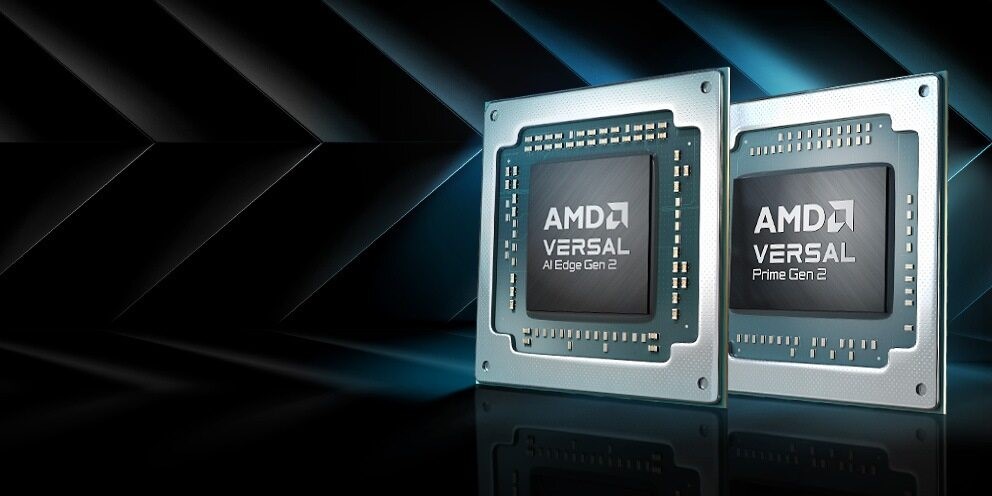
AMD has announced the expansion of the AMD Versal™ adaptive system on chip (SoC) portfolio with the new Versal AI (Artificial Intelligence) Edge Series Gen 2 and Versal Prime Series Gen 2 adaptive SoCs. These bring preprocessing, AI inference, and postprocessing together in a single device for end-to-end acceleration of AI-driven embedded systems.
These initial devices in the AMD Versal Series Gen 2 portfolio build on the first generation with powerful new AI Engines expected to deliver up to 3x higher TOPs-per-watt than first-generation AMD Versal AI Edge Series devices, while new high-performance integrated Arm® CPUs are expected to offer up to 10x more scalar compute than first gen Versal AI Edge and Prime series devices.
“The demand for AI-enabled embedded applications is exploding and driving the need for single-chip solutions for the most efficient end-to-end acceleration within the power and area constraints of embedded systems,” said Salil Raje, Senior Vice President and General Manager, Adaptive and Embedded Computing Group, at AMD. “Backed by over 40 years of adaptive computing leadership, these latest generation Versal devices bring together multiple compute engines on a single architecture offering high compute efficiency and performance with scalability from the low-end to high-end.”
AMD Versal Series Gen 2: A Mix of Balance, Power, Functionality, and Security
Balancing performance, power, area, together with advanced functional safety and security, Versal Series Gen 2 devices deliver new capabilities and features that enable the design of high-performance, edge-optimised products for the automotive, aerospace and defense, industrial, vision, healthcare, broadcast, and pro AV markets.
Powering Subaru’s Next-Gen ADAS Vision System Subaru Corporation has selected Versal AI Edge Series Gen 2 devices for the company’s next-generation advanced driver-assistance system (ADAS) vision system, known as EyeSight.
The EyeSight system is integrated into select Subaru car models to enable advanced safety features, including adaptive cruise control, lane-keep assist, and pre-collision braking. Subaru is using AMD adaptive SoC technology in current EyeSight-equipped vehicles.
“Subaru has selected Versal AI Edge Series Gen 2 to deliver the next generation of automotive AI performance and safety for future EyeSight-equipped vehicles,” said Satoshi Katahira, General Manager, Advanced Integration System Department & ADAS Development Department, Engineering Division, at Subaru Corporation. “Versal AI Edge Gen 2 devices are designed to provide the AI inference performance, ultra-low latency, and functional safety capabilities required to put cutting-edge AI-based safety features in the hands of drivers.”

Versal AI Edge Series Gen 2
To meet the complex processing needs of real-world systems, AMD Versal AI Edge Series Gen 2 devices incorporate an optimal mix of processors for all three phases of AI-driven embedded system acceleration:
- Preprocessing. FPGA programmable logic for real-time preprocessing with unparalleled flexibility to connect to a wide range of sensors and implement high throughput, low latency data processing pipelines
- AI Inference. An array of vector processors in the form of next-gen AI Engines for efficient AI inference
- Postprocessing. Arm CPU cores providing the postprocessing power needed for complex decision-making and control for safety-critical applications.
This single-chip intelligence can eliminate the need to build multi-chip processing solutions, resulting in smaller, more efficient embedded AI systems with the potential for shorter time-to-market.
Versal Prime Series Gen 2
The AMD Versal Prime Series Gen 2 provides end-to-end acceleration for traditional, non-AI-based embedded systems by combining programmable logic for sensor processing with high-performance embedded Arm CPUs.
Designed to offer up to 10x more scalar compute compared to the first generation, these devices can efficiently handle sensor processing and complex scalar workloads. With new hard IP for high-throughput video processing, including up to 8K multi-channel workflows, Versal Prime Gen 2 devices are ideally suited for applications such as ultra-high-definition (UHD) video streaming and recording, industrial PCs, and flight computers.
Broad and Scalable Portfolio
The Versal AI Edge Series Gen 2 and Versal Prime Series Gen 2 portfolios provide scalability from edge sensors to centralised compute for AI-driven systems. They feature a range of devices with increasing amounts of AI and adaptive compute to allow customers to select the performance, power, and area footprints to efficiently achieve application performance and safety targets.
Streamlined Design Cycles
The AMD Vivado™ Design Suite tools and libraries help boost productivity and streamline design cycles for embedded hardware system developers, offering fast compile times and enhanced quality of results.
For embedded software developers, the AMD Vitis™ Unified Software Platform enables embedded software, signal processing, and AI design development at users’ preferred levels of abstraction, with no FPGA experience needed.
Designers can get started with AMD Versal AI Edge Series Gen 2 and Versal Prime Series Gen 2 early access documentation and first-generation Versal evaluation kits and design tools available today. AMD expects availability of Versal Series Gen 2 silicon samples in the first half of 2025, followed by evaluation kits and System-on-Modules samples in mid-2025, and production silicon expected in late 2025.
 (0)
(0) (0)
(0)Archive
- October 2024(44)
- September 2024(94)
- August 2024(100)
- July 2024(99)
- June 2024(126)
- May 2024(155)
- April 2024(123)
- March 2024(112)
- February 2024(109)
- January 2024(95)
- December 2023(56)
- November 2023(86)
- October 2023(97)
- September 2023(89)
- August 2023(101)
- July 2023(104)
- June 2023(113)
- May 2023(103)
- April 2023(93)
- March 2023(129)
- February 2023(77)
- January 2023(91)
- December 2022(90)
- November 2022(125)
- October 2022(117)
- September 2022(137)
- August 2022(119)
- July 2022(99)
- June 2022(128)
- May 2022(112)
- April 2022(108)
- March 2022(121)
- February 2022(93)
- January 2022(110)
- December 2021(92)
- November 2021(107)
- October 2021(101)
- September 2021(81)
- August 2021(74)
- July 2021(78)
- June 2021(92)
- May 2021(67)
- April 2021(79)
- March 2021(79)
- February 2021(58)
- January 2021(55)
- December 2020(56)
- November 2020(59)
- October 2020(78)
- September 2020(72)
- August 2020(64)
- July 2020(71)
- June 2020(74)
- May 2020(50)
- April 2020(71)
- March 2020(71)
- February 2020(58)
- January 2020(62)
- December 2019(57)
- November 2019(64)
- October 2019(25)
- September 2019(24)
- August 2019(14)
- July 2019(23)
- June 2019(54)
- May 2019(82)
- April 2019(76)
- March 2019(71)
- February 2019(67)
- January 2019(75)
- December 2018(44)
- November 2018(47)
- October 2018(74)
- September 2018(54)
- August 2018(61)
- July 2018(72)
- June 2018(62)
- May 2018(62)
- April 2018(73)
- March 2018(76)
- February 2018(8)
- January 2018(7)
- December 2017(6)
- November 2017(8)
- October 2017(3)
- September 2017(4)
- August 2017(4)
- July 2017(2)
- June 2017(5)
- May 2017(6)
- April 2017(11)
- March 2017(8)
- February 2017(16)
- January 2017(10)
- December 2016(12)
- November 2016(20)
- October 2016(7)
- September 2016(102)
- August 2016(168)
- July 2016(141)
- June 2016(149)
- May 2016(117)
- April 2016(59)
- March 2016(85)
- February 2016(153)
- December 2015(150)
